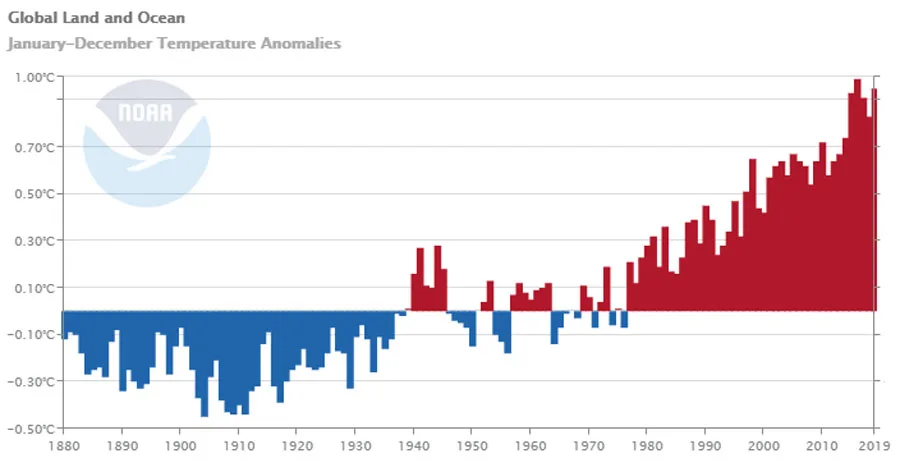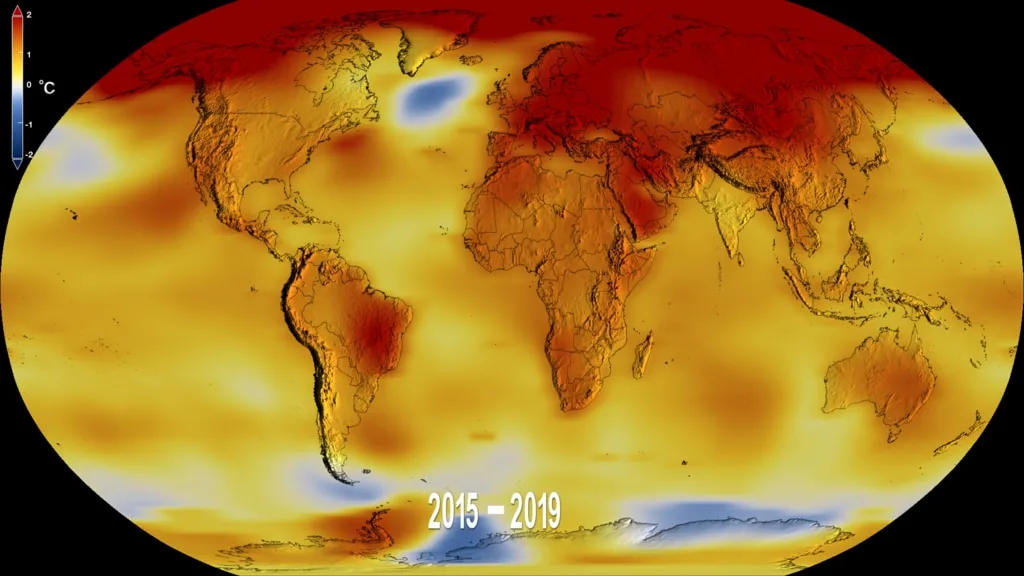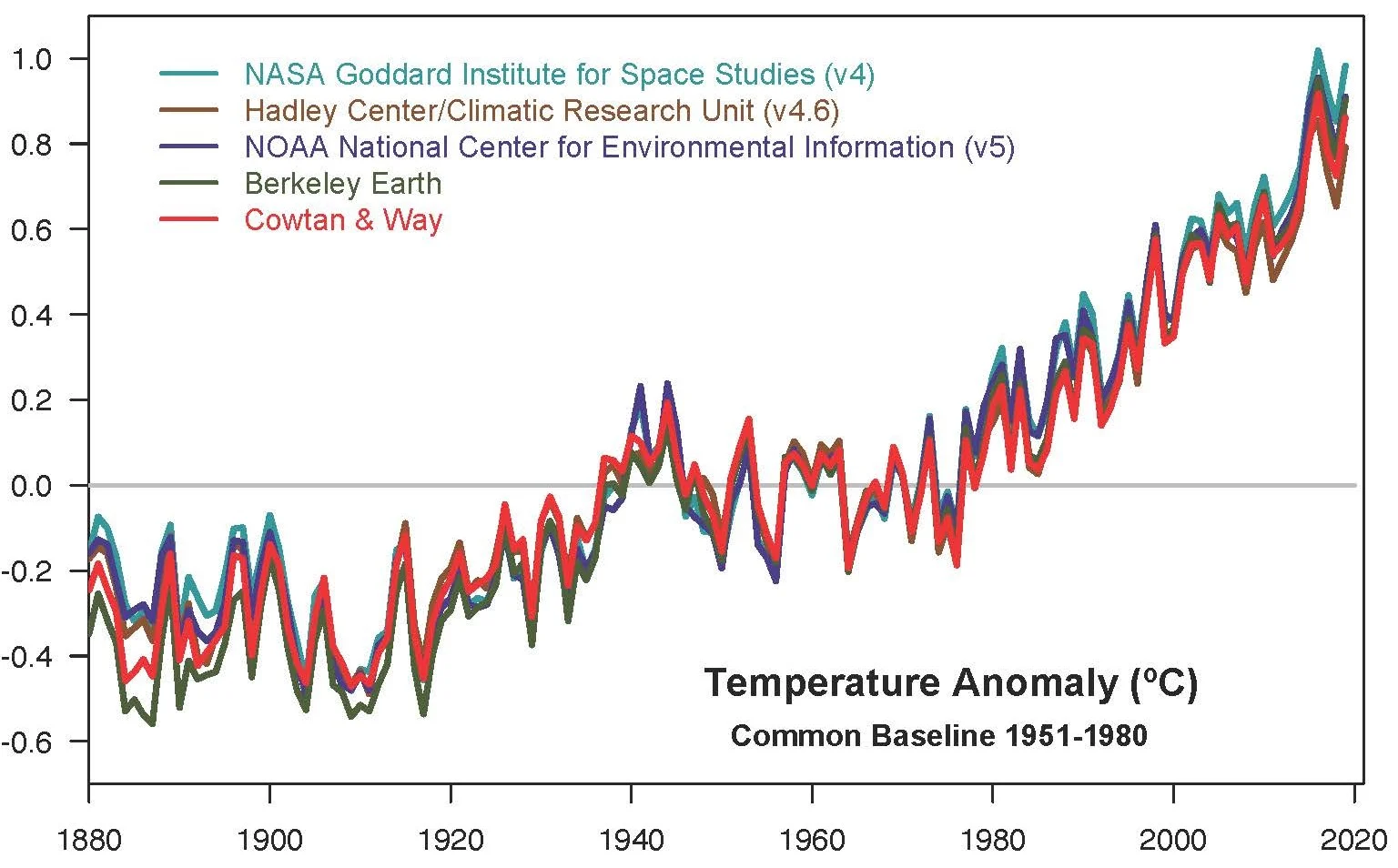
Earth just suffered through a new second hottest year on record
In the past 140 years of global temperature records, only 2016 was hotter than last year
With all global temperatures measured and tallied from 2019, both NASA and NOAA now rank last year as the second hottest in the record books.
According to NOAA, 2019's global temperatures were 0.95°C above the 20th century average. The only year hotter than 2019 in their record books, now, is 2016, which had an average global temperature anomaly of 0.99°C above the 20th century average.

NOAA temperature anomaly time-series from 1880-2019. Credit: NOAA
2019 was the 43rd consecutive year with an annual global temperature above the 20th century average. That makes 1976 the last year where the world managed to come in as slightly cooler than average!
Meanwhile, 2019 saw record-setting ocean warmth, and set some alarming trends for sea ice. According to NOAA, both the Arctic and Antarctic reached their second-lowest annual average extents in 2019. Also, the records of the National Snow and Ice Data Center (NSIDC) show that Arctic sea ice experienced the longest stretches of record-low extent in recent memory.
Based on NASA's records, 2019 came in at a full 1.0°C above the 20th century average, also putting it as the second warmest year after 2016 (which had a temperature anomaly of +1.04°C above the 20th century average).
The warmest five years in the record books are the past five years, 2015 to 2019. Of the warmest ten years on record, nine of those have been in the past ten years (1998 still retains the #10 spot).

This plot of temperature anomalies averaged from 2015-2019 reveal the hottest places on the planet over the past five years. Individually, from 2015 to 2019, have been the warmest five years of the past 140 years. Credit: NASA GISS
"The decade that just ended is clearly the warmest decade on record," Gavin Schmidt, the director of NASA's Goddard Institute for Space Studies, said in a press release on Wednesday. "Every decade since the 1960s clearly has been warmer than the one before."
Japan's Meteorological Agency (JMA) also tallies global temperature records, and they now rank 2019 as tied with 2015 for the second warmest year on record, at +0.42°C above the 1981-2010 average, or +0.78°C above the 20th century average. 2016 remains the hottest year in their records.
The differences between the values computed by these and other agencies are a result of each gathering temperatures from slightly different sources and using somewhat different techniques for tallying and averaging those temperatures. This is done by design. With these different agencies reaching the same relative conclusion using different data sets and methods, each acts as a check of the others, strengthening the certainty of that conclusion.

This plot of yearly temperature anomalies from 1880 to 2019, compared to the 1951-1980 mean, presents data recorded by NASA, NOAA, the Berkeley Earth research group, the Met Office Hadley Centre (UK), and the Cowtan and Way analysis. Despite minor variations from year to year, all show peaks and valleys in sync with each other and all show rapid warming in the past few decades, with the past decade being the warmest. Credits: NASA GISS/Gavin Schmidt
2016 was marked by intense global heat, in part due to the persistent effects of a record-setting El Niño in the equatorial Pacific Ocean. Even though that El Niño reached its peak in November of 2015, it still strongly influenced global temperatures throughout the first half of 2016. Not even the La Niña that developed in the latter half of 2016 was able to counter its impacts and keep it from becoming the warmest year on record.
What is remarkable about 2019 is that global temperatures surpassed 2015, and were even very close to the 2016 average, all without the influence of a record-setting El Niño.
A weak El Niño was in effect for the first half of the year, of course. However, this reveals how human-caused climate effects are dominating over natural ones. Based on this, it will not be long before we have an 'ENSO-neutral' year, or even a La Niña year, that surpasses all others as the warmest year on record.

